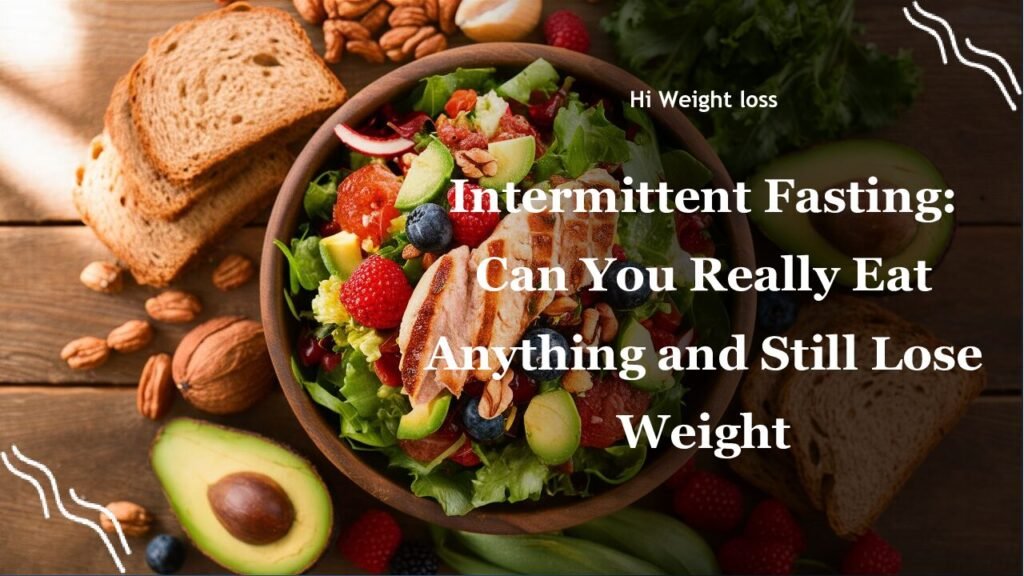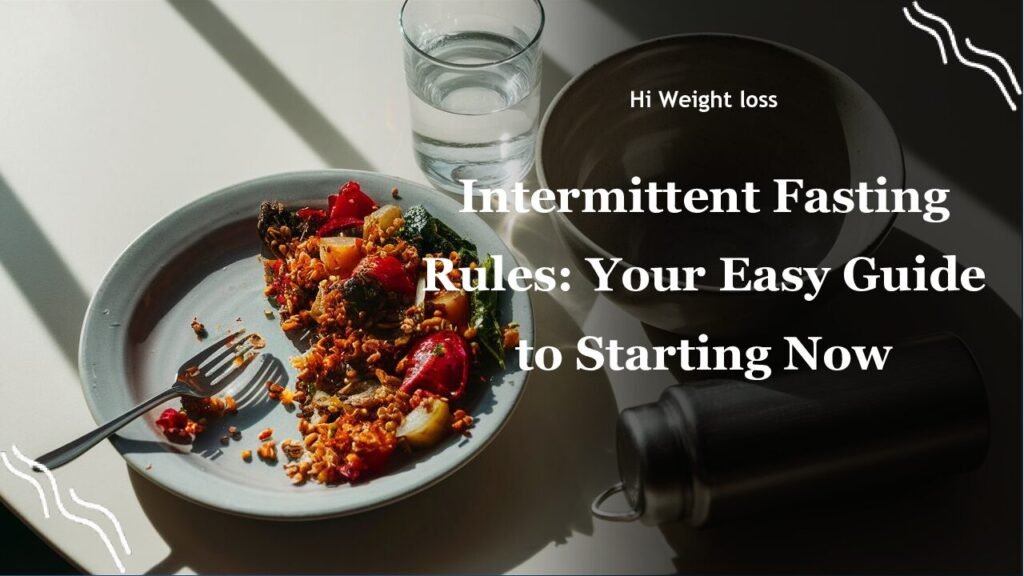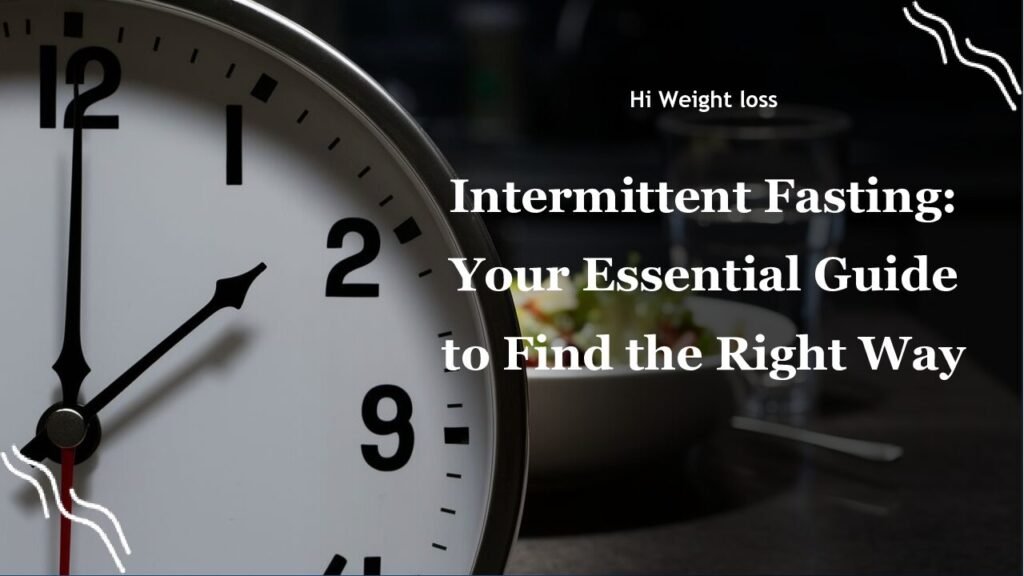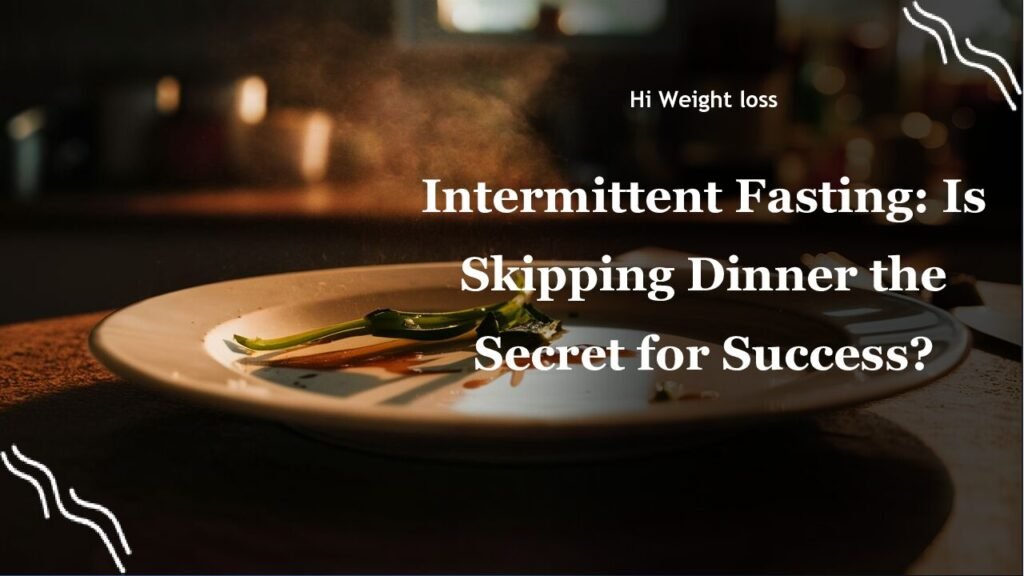“`
Wondering if you can eat whatever you want during intermittent fasting and still lose weight? It’s a common question, and the answer isn’t a simple yes or no. Many people start intermittent fasting hoping it’s a magic ticket to effortless weight loss, dreaming of burgers and fries during their eating windows, but that’s not exactly how it works. Let’s explore how to make the most of your fasting window while still enjoying food and losing weight.
Can You Really Eat Whatever You Want While Intermittent Fasting and Still Lose Weight?
Intermittent fasting is a popular eating pattern, not a diet, where you cycle between periods of eating and fasting. Some people imagine they can indulge freely during their eating window. The truth is, while you *can* eat, what you eat still matters, especially if your goal is weight loss. Think of it like this: a car needs the right fuel, not just any fuel, to run efficiently. Similarly, your body needs nutritious food to lose weight effectively.
The Myth of “Eat Anything” During Intermittent Fasting
I remember when my friend Sarah started intermittent fasting. She thought her eating window was a green light for pizza and ice cream every day. While she did lose some weight initially due to the shorter eating window, she soon realized she felt sluggish and wasn’t seeing the sustainable results she hoped for. Sarah learned firsthand that intermittent fasting isn’t a free pass to eat unhealthy foods without consequences. It’s about *when* you eat, not *what* you eat.

While intermittent fasting does create a short-term calorie deficit by restricting your eating time, if you fill that window with junk food, high-fat, high-sugar, and ultra-processed foods, you could potentially undo all of your weight loss efforts. It’s like trying to fill a leaky bucket with more water than the leak. The key is finding balance with good nutrition.
The Importance of Nutrient-Dense Foods During Your Eating Window
So, what should you be eating during your eating window? Focus on nutrient-dense foods. These are foods packed with vitamins, minerals, and antioxidants, which are vital for good health. Consider fruits, vegetables, lean proteins, and whole grains. These foods not only keep you full longer, but they also provide the essential fuel your body needs. Remember, “You can eat junk food” during your eating window, but it’s far from optimal. As Fasting with Laura points out, making healthy choices is essential for success.
For example, instead of a sugary donut, try a bowl of oatmeal with berries and nuts. Instead of a greasy burger, opt for a grilled chicken salad with plenty of vegetables. These swaps can make a big difference over time. Your body will thank you for the quality fuel.
Calorie Balance Still Matters
While intermittent fasting can help you naturally reduce your calorie intake due to the limited eating window, it’s crucial to ensure you’re not eating *too* little or too much. Mayo Clinic highlights that caloric restriction can aid weight loss. But if you severely restrict calories, your body may go into starvation mode, slowing down your metabolism, which can make weight loss harder. Conversely, if you overeat during your eating window, even if it’s all healthy food, you might not lose weight.
It’s about finding a balanced approach. Be mindful of your portion sizes and listen to your body’s hunger cues. A sensible, nutritious meal plan will allow you to lose weight effectively without causing harm to your body. It’s about sustainable habits, not quick fixes.
The Impact of Unhealthy Foods on Your Weight Loss Journey
Think of unhealthy foods like high-fat, high-sugar, and ultra-processed foods, as roadblocks in your weight loss journey. While you might see initial weight loss from the fasting aspect of intermittent fasting, relying on these types of foods can lead to a plateau. These foods tend to be high in calories and low in nutrients, which means you can easily consume a lot of calories without feeling full. You end up consuming more calories than you need, hampering your ability to lose weight. Additionally, unhealthy foods can cause fluctuations in your blood sugar levels, which can lead to cravings and energy dips.
It’s not just about the scale. Eating too much junk food can make you feel tired, bloated, and can negatively impact your mood. It’s important to fuel your body with foods that make you feel good, inside and out.
Health Considerations and Intermittent Fasting
It’s essential to think about your overall health when considering intermittent fasting. If you have specific health conditions, such as diabetes, kidney stones, or gastroesophageal reflux disease, as pointed out by Mayo Clinic, consulting with a healthcare provider before starting is a must. They can offer tailored advice and help you determine if intermittent fasting is safe and suitable for you. They can also help you navigate any potential risks associated with intermittent fasting.
Your health is the most important thing, always. Be sure to check that intermittent fasting is right for you, and don’t hesitate to seek help from a professional.
Making Intermittent Fasting Work for You
So, how do you make intermittent fasting work effectively? Focus on incorporating plenty of whole, unprocessed foods into your eating window. This means lots of fruits, vegetables, lean proteins, and whole grains. Think colorful, nutrient-packed meals that keep you full and satisfied. As Harvard Health suggests, it is not just about when you eat but also what you eat. You’ll find that your body responds much better when you feed it well.
Also, be mindful of your portion sizes and don’t overeat simply because you can. Pay attention to how you feel after you eat, and adjust as needed. It’s a learning process, and you’ll become more intuitive about what works best for you over time.
Tracking Your Progress
Keeping track of your progress can be a great way to stay motivated. Consider keeping a food journal to monitor what you’re eating and how it makes you feel, also keeping track of how your weight and measurements fluctuate over time can help you stay on track. Also, taking regular photos can help you see progress that the scale might not capture.
Here is a table to assist you in recording your progress in a more detailed way:
| Date | Weight (lbs) | Waist Measurement (inches) | What you ate during your eating window | How you felt (energy levels, mood) |
|---|---|---|---|---|
| YYYY-MM-DD | [Enter Weight] | [Enter Waist Measurement] | [Enter Foods Eaten] | [Enter Feeling] |
| YYYY-MM-DD | [Enter Weight] | [Enter Waist Measurement] | [Enter Foods Eaten] | [Enter Feeling] |
| YYYY-MM-DD | [Enter Weight] | [Enter Waist Measurement] | [Enter Foods Eaten] | [Enter Feeling] |
Conclusion
So, can you eat whatever you want while intermittent fasting and still lose weight? The short answer is no, not if you want sustainable results. While intermittent fasting gives you a timeframe for eating, it’s not a license to consume unhealthy foods. The focus should be on eating nutritious, whole foods, balancing your caloric intake, and keeping your body well. Think of it as a journey, not a destination. Remember Sarah’s experience? She had to learn that balance and nutritious choices are just as crucial as the fasting periods. It’s about making mindful choices that support your health and wellness goals. Don’t think of it as a restrictive diet, instead embrace a healthier lifestyle, and make informed decisions with every bite.
Ready to start your intermittent fasting journey with a focus on nutritious eating? Share this article with someone who’s wondering the same question, and let them know that it’s more than just *when* you eat – it’s *what* you eat that matters most.
FAQ
Can I eat unhealthy foods in moderation during intermittent fasting?
Yes, you can eat unhealthy foods occasionally, but they shouldn’t be the norm. Prioritize nutrient-dense foods most of the time to see the best results.
Will I gain weight if I eat too much during my eating window?
Yes, it’s possible. Overeating, even healthy foods, can lead to weight gain. Calorie balance is still important, so practice mindful portion control.
How do I know if intermittent fasting is right for me?
Consult with your healthcare provider before starting intermittent fasting, especially if you have any existing health conditions. They can help you determine if it’s a safe approach for you.
What kind of foods should I focus on during my eating window?
Focus on a balance of fruits, vegetables, lean proteins, and whole grains. These foods provide essential nutrients and keep you feeling full and satisfied.
How much weight can I expect to lose if I combine intermittent fasting with a healthy diet?
Weight loss varies from person to person. Combining intermittent fasting with a healthy diet can lead to sustainable weight loss over time. Just be patient, consistent, and mindful.
“`



